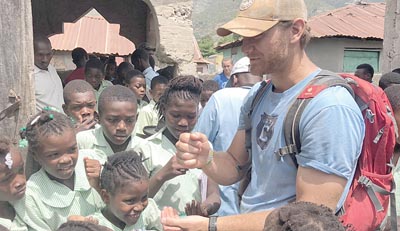Pifer: Haitian ‘consistent’ poverty ‘a culture shock’
 Chris Pifer, Christ Covenant Student Ministries director, teaches “Rock, paper, scissors” to children in Haiti during the church’s youth mission trip from May 31 to June 9.
Chris Pifer, Christ Covenant Student Ministries director, teaches “Rock, paper, scissors” to children in Haiti during the church’s youth mission trip from May 31 to June 9.
“It was almost like shock because the poverty, compared to a lot of islands in the Caribbean, is consistent,” he said.
Pifer headed a group of 14 high school youth and three other adults on a trip to Haiti, serving Many Hands for Haiti, a mission organization.
The group helped distribute food to the community and carts to people who could not walk, helped repair roads, worked on the ministry campus and poured concrete floors in people’s homes.
All the while, they used the experience to share the word of Christ.
“Everything’s spiritual,” Pifer said. “Everything comes from a heart of serving God.”
As they provided services to Haitians, he said, “We had aspects of evangelism.
“We discussed Christ with them and shared Christ’s love through our actions,” Pifer said. “One of the people came to Christ during (a food distribution).”
The trip also provided fellowship — playing soccer and other games with children in Haiti, visiting an orphanage and enjoying time spent with them, he added.
While the church’s youth group went to Haiti four years ago, this trip was Pifer’s first experience in that country, as well as that of most of the students who went.
“From the time we landed in Port-au-Prince, and we drove four hours to Pignon (a commune in the Saint-Raphaël Arrondissement), there was consistent poverty,” he observed. “It was a culture shock, mostly.
“There’re no jobs, so people are trying [to do] subsistence farming, just enough to live off of
to feed their families,” Pifer added. “We saw four generations living in what we would call a shed almost.
“I guess an image, you could say, is take an American house and strip away all the insides and you have a shell. That’s what I would compare the living conditions there.
“You drive down our streets, and everything’s nice, neat and built well,” Pifer said. “There, (they have) half-built structures.
“There’s houses put together with cinder block and rusting tin roofs or mud-thatched houses,” he added. “No one stays in the houses. They leave. They only sleep there.
“It doesn’t mean (the culture is) wrong; it’s just different because we are comparing Western society to a different country.”
Still, he said, “God’s blessed us with a lot, but also it made me feel a sense of responsibility.
“We need to be using those blessings to serve others,” Pifer added. “You see people need food. They need medical attention.
“Our kids were soaking it in the whole time. A lot of kids struggled with it.”
One emotional experience for him was meeting a 24-year-old man named Herby.
“He worked with us on a few sites,” Pifer said. “Both his parents died (when Herby was) 14. He lived with his grandparents and had three brothers.
“Just talking to him, sharing our lives a little bit and seeing how different they were, and he was still glorifying God and loved God and pursued him,” he added.
“Even though we would consider (Herby) coming from nothing — barely having enough food to eat, having to walk to wells to get clean water and just the necessities of life that they struggled to even have for themselves — yet he still glorified God.”
Pifer, who has been with the church as boys ministry director for two years, was hired as student ministries director June 1. He is the nephew of Andy Pifer, who left the director position in May.
“In the past, we have done a foreign trip every other year,” he said. “We’ve been to the Bahamas, we’ve been to Ecuador, we’ve been to Belize.”
In between, youths take domestic trips — Salt Lake, North Carolina and Alaska, among others, he added.
“So we’ve been to a lot of places,” he said.


